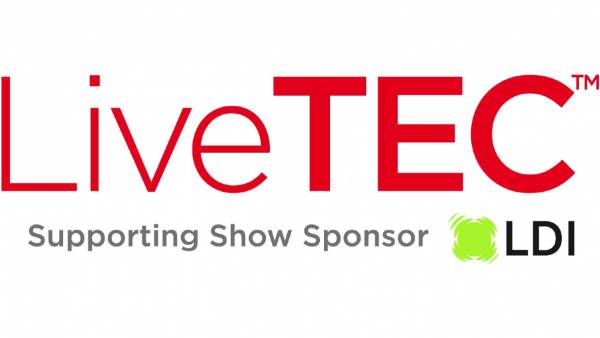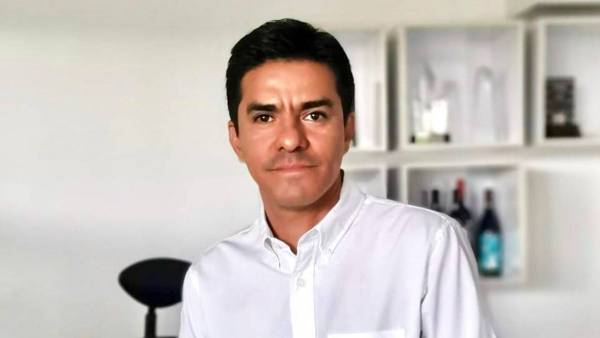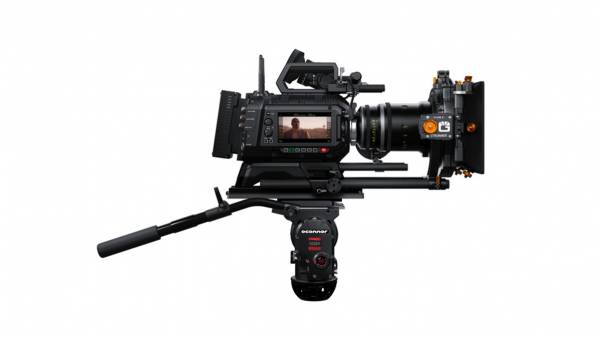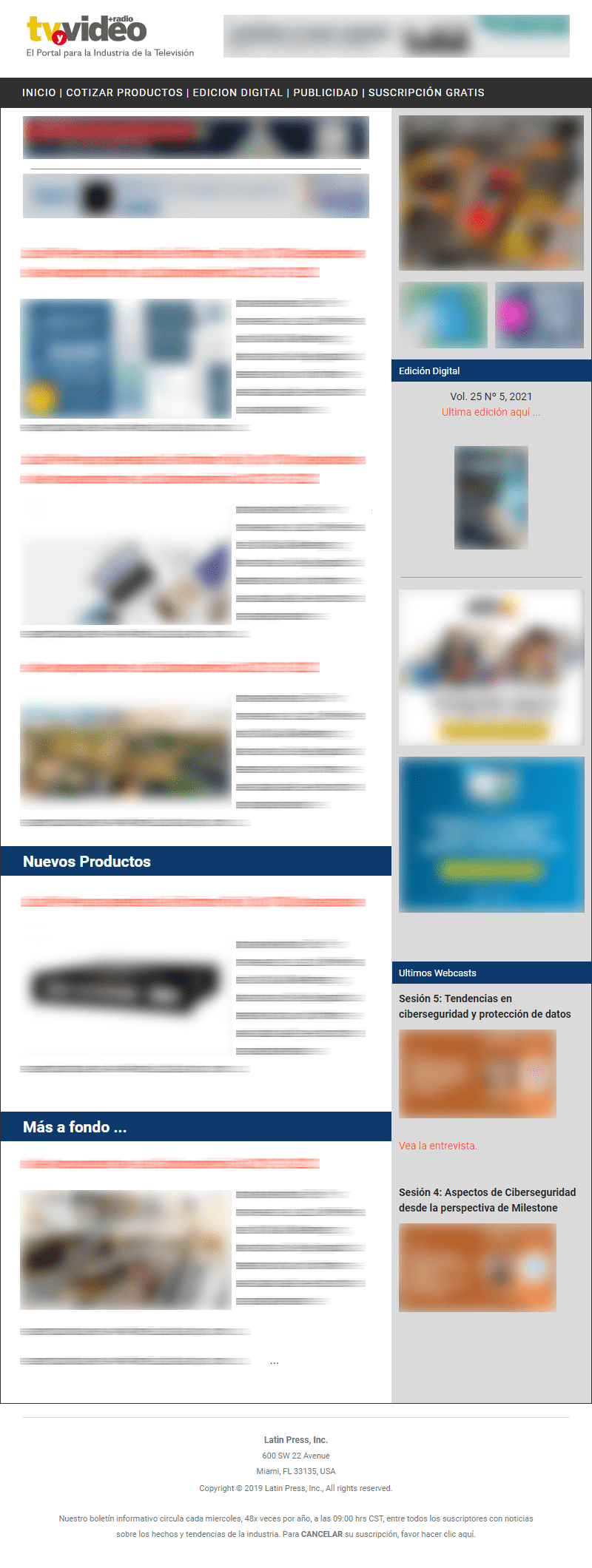TV&V: For several years, Latin America has been one of the regions with the highest rates of piracy and theft of television signals, what do you think are the main causes of this phenomenon?
Lionel Remigio
: The causes are numerous, among which is the lack of adequate structures to offer programming to customers who request it. Some cable operators who wanted certain channels could not obtain them because they were either not available in certain areas, or they were not sold due to the requirement of certain legal licensing requirements, which as in the case of Venezuela and Colombia, were not issued by governments. This gave rise to a GREY market in which channels were subscribed in the United States and received in Latin American countries. The operator could sell its signal cheaply and accustomed customers to low rates that then rose when they had to be legalized. That also gave rise to signal theft. Subscribers failed to understand how something that was previously cheap could increase by up to 50% of the previous cost.
I must clarify that Latin Americans have no tradition of pay television and consumer education about it has been minimal or very misguided. That has brought bad consequences. And the public, which is not usually aware of legal matters, assumes that television is free. This is also influenced by the high and abusive prices of certain channels, which force us to look for alternatives to legal operations. Programming costs can cause the closure of small companies that start in business and the only means of survival they have is the cheap acquisition of signals obtained through piracy.
TV&V: What do you think is the solution?
LR: In cable, thanks to digital converter boxes, it is more difficult for this to happen. A system that transmits only digital signals is virtually protected from piracy because it needs a digital converter to present the channels. Right now in the United States, digital systems in their entirety do not present piracy problems, but as technology becomes accessible to the public those boxes or digital converters and, as long as users continue to pay for piracy, there will always be a brain that does what is necessary to receive them. Someone who tempted by the money he can earn, will compromise the security of those systems.
I believe that in today's world, because of the Internet, where communications are immediate, there are the means and resources to be able to compromise digital systems without the slightest effort and that cannot be avoided in its entirety.
TV&V: The trend in this problem is one of inevitable increase. There are more and more users and pirate operators who take advantage of technology for this activity, what ways out are there to combat this crime?
LR: The only way out is the application of stronger laws. To this day the issue of piracy has been poorly raised legally. No one sees the issue as ordinary theft. Connecting illegally is an identical theft by stealing a shirt from a store.
Until the laws change and exemplary sanctions are given, no one will learn. When this happens in Latin America and the pirates know that strong laws are going to be applied, they will think twice. Although it must be said that there will always be piracy despite the measures that are taken, no matter how strong they are.
TV&V: How do you explain that in the same country, which advocates for the defense of copyright and for the protection of companies and legal users that are part of this industry, it is the country where the production of equipment and devices for the illegal market of the Pirate TV ñales?
LR: The United States is made up of 50 states with different and unique laws. It is a legal and complicated process where each state has laws that are its own and sovereign. As a general rule, you can sell from one state a cable box or converter bound for another state, but that sale is illegal in the state where the seller is based. That business operation is perfectly legal. There are also clauses where you must warn the buyer that it is illegal to use that box if you do not first call the cable operator to which you are subscribed. In fact, whoever buys the box is the one who violates the law since the warning relieves the manufacturer of responsibility.
TV&V: What kind of campaigns should be implemented to deal with pirates?
LR: The campaigns that can be developed in the same systems of cable television, written press and radio. You have to educate people. Tell them that signal theft is theft wherever it is committed. If there are no laws, campaigns are a waste of time and money. The pirate will continue with his activities knowing that there will be no legal punishment for his crime.
TV&V: Can the offer of value-added services within the cable television service be an alternative to discourage the increase in users of illegal signals?
LR: It is possible, but I personally think not, that does not discourage the activity.
TV&V: What will happen to the Latin American market in this sector if the increase in this phenomenon continues?
LR: If the PIRACY PROBLEM increases, we will see slow growth in the area, but not necessarily a "demise" of the industry as such. Systems will take longer to raise capital to develop other services such as Internet, Telephony, etc. If we consider that piracy, according to specialists, begins to be a problem when it reaches 10%, in the case of a company like Direc TV that has 5 million subscribers, that 10% represents half a million subscribers who do not pay for the signal. That's a huge sum of money. The lack of serious statistics in Latin America prevents us from knowing for sure how far that number of offenders could go and the real dimensions of the problem in this region.
TV&V: Which are the most critical countries?
LR: Without fear of being wrong, Colombia and Venezuela. Venezuela for a couple of years has created strong laws to reduce levels of illegality. There are also many investments and this has brought more seriousness and professionalism in the industry. Central America has also begun to draft its laws and, in Guatemala, a law was recently passed in this regard. You can't have immediate answers to a problem that's so old.
TV&V: When there is convergence between television and the internet and the massive use of these two technologies, do you not think that the problem can become uncontrollable?
LR: No, in fact it will not be so because the Internet service is technology that requires identification to access the system. You can connect to a cable service and watch channels, but you won't have internet if you connect illegally. Internet protocols require authentications that require a user name and a key that if they are not enabled in the system, it will not service it.
TV&V: How do you make a cable TV station safe and able to establish and control piracy attempts?
LR: First of all, digitizing signals is a great solution. There are not yet illegal boxes on the market that capture these signals. But digitizing a system in Latin America is a dream that in most cases is impractical.
An analog system can implement conditional access systems that offer greater control. Even in the simplest system, certain measures can be implemented that reduce the incidence of piracy. But the ideal would be a digitized system in its entirety, with conditional access and secure for it. But that would be the ultimate expression of security that due to the situation of most Latin American countries, is not always feasible.
























Leave your comment